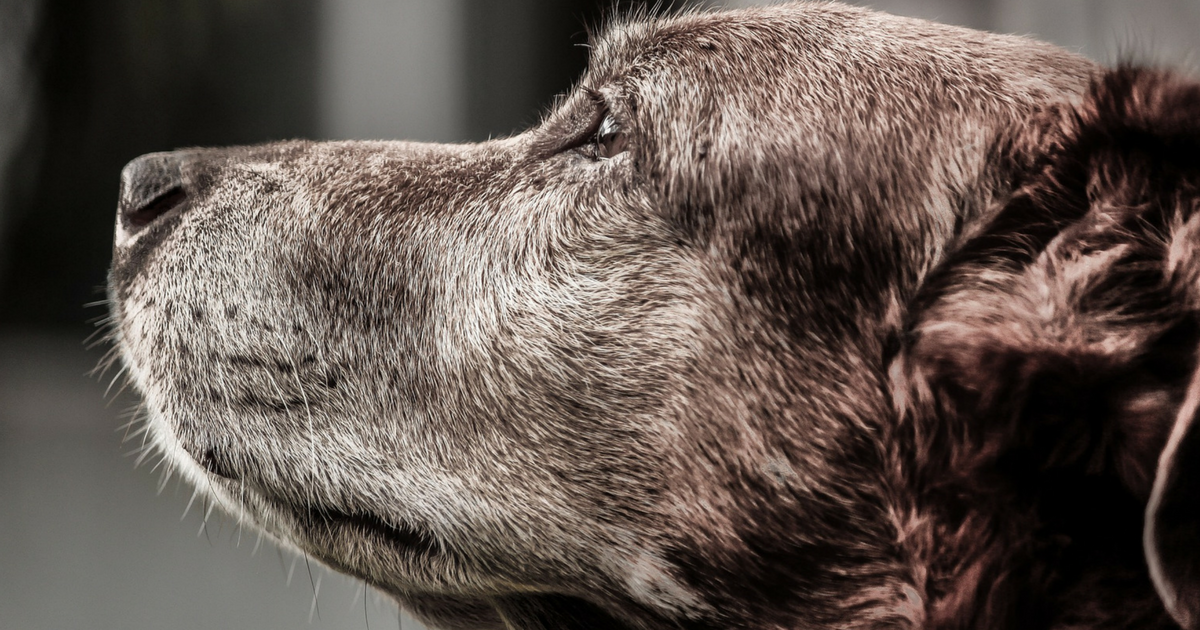
8 Symptoms to Look for in an Aging Dog
It is never easy to watch our beloved pets get older. As they age we see the white hairs coming through and notice they slow down significantly. Some of these symptoms you may dismiss as simply the joys of getting older (like not wanting to go for a run). But there are also other indicators that you should pay more attention to. Some symptoms of an aging dog are harder to spot and may affect their health (joint pain, hearing loss, blindness, etc.). If you are aware of these symptoms, take action to relieve the aches and pains to give your dog a healthy, happy life. Here are 8 symptoms to look for in an aging dog and how to help them through them.
Difficulty Getting Up
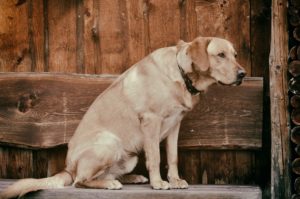
As a young pup, your dog would go from lying down to jumping up in a matter of seconds. But as your dog ages, you will begin to see a slower progression in his movements. Suddenly he doesn’t jump up on the bed and isn’t willing to run around at the dog park. Difficulty getting up is often a result of a life well lived. Ease your dog’s struggle by allowing him take his time when rising from a relaxed position and while travelling from place to place. Another way to ease this symptom of aging is to provide soft surfaces for him to sit and lie down. This can act as a cushion for aching joints, relieving any pressure they feel. Ramps can also be made for easier access to things higher up (ex. bed, couch, etc.). If your dog suffers from joint pain, you can also use supplements such as Canine 15 Natural to give him comfort. This natural supplement acts as an anti-inflammatory and relieves the pressure in his joints. Making sure your furry friend is comfortable is the number one priority. When you see your dog having difficulty getting up, we know you will do all you can to help.
Less Energy
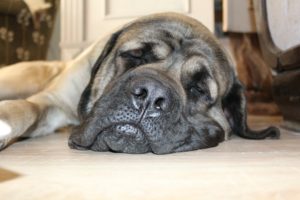
As we all age, our movements slow and our energy decreases. Both aging dogs and humans will lose the vivacity they once possessed. As a puppy, your dog was non-stop moving from one activity to the next. But with an aging dog, you will notice she lays around more and only gets up when called upon. Older dogs will preserve their energy for the times they need it most and therefore sleep more often. If you find your dog sleeping more than usual, it could be a symptom suggesting your dog is aging. Don’t worry, this doesn’t mean that playtime and walks are over. Just because she is not running up and down the stairs with you, does not mean she is ill. She is saving up her energy instead for those evening walks and play times in the backyard! The best way to help your dog is to let her sleep when she wants and let her listen to her body if it’s telling her to take a rest.
Bad Breath

Dogs can’t brush their teeth; if they did, a video would be up on YouTube. It may seem like common sense, but one symptom to look for in an aging dog is bad breath. As your dog ages, their teeth will build up plaque and teeth will decay. Even if you are the best owner and brush your dog’s teeth often, their oral health will still decrease (just at a slower pace). Dogs always have something in their mouth and are constantly chewing things, it is only expected that their teeth should face the test of time. Any funny smell in their mouth is considered bad breath – a healthy oral smell should not have any odour. If you do smell bad breath, speak to your vet about it. Some oral problems have an easy solution (mouth washes), whereas others may be too late to change. No matter what their breath smells like, continue to brush their teeth often!
Weight Gain

Another symptom of an aging dog is their weight. In their later years, you can find your dog gaining excessive weight and slowing down because of it. Because his movement is limited and he has less energy, he may not be getting enough exercise needed to lose the weight. This does not mean that you need to push your aging dog into a run each time you are out. It may just mean that you need to adjust his meals to cope with the slowed metabolism. Speak with your vet about the best approach to help your dog lose weight. You want to ensure that you do it in a way that does not put more strain on his body.
Hearing Loss

If you have found that your dog is less willing to obey and respond, it may not be just stubbornness. As dogs age, it is common for their hearing to deteriorate. You may have to get in front of her to get her attention or say commands a bit louder. If your dog loses their hearing altogether, start communicating with hand signals. Hand signals are a great way to converse with your dog if she can’t hear you. She will associate a gesture with a command and therefore understand what you want from her. Slowly couple these with your voice-commands to prepare as she begins to age.
Decreased Bladder Control
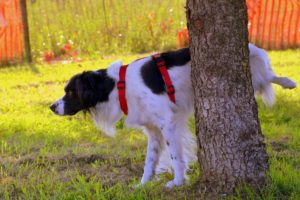
One of the hardest and most frustrating symptoms of an aging dog is a decrease in bladder control. This is seen in a frequent need to go outside or even total loss of bladder control. It is times like these that you will need to be patient with your dog. Despite being upset about having to constantly take him outside or clean up another mess, it is important to stay calm. When your dog does urinate in the house unexpectedly, be relaxed and reassuring for your dog. He will most likely feel ashamed and guilty, as he knows he is not supposed to do that. Fortunately, decreased bladder control can be alleviated with certain changes to diet or medication if necessary. If you find your aging dog having bladder issues, consult your vet and discuss what options would be best for your pet.
Loss of Appetite
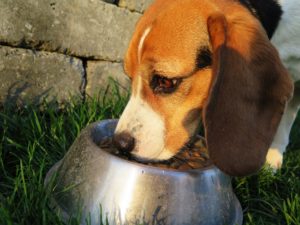
On the opposite side of weight gain, some aging dogs may lose weight due to a loss of appetite. You will recognize this symptom quickly as she will not finish meals and is not as eager for treats. There are a number of reasons your dog may not be eating: upset stomach, the food hurts her teeth, or she has become picky. Whatever the reason, if you suspect your dog has lost her appetite, book a visit with the vet. Although it may be something as simple as she is tired of the same old kibble, it is good to stay informed and ensure your dog is healthy. If the reason is pickiness, changing up the food to another flavour or switching over to wet food can help. Wet food is good to keep your dog hydrated and reduce pain that dry food would put on decaying teeth. If the reason for loss of appetite is more severe (such as kidney failure or heart problems), your vet may recommend medication or other approaches to help with these symptoms.
Decreased Sight

It may be funny the first time your dog doesn’t see the door and bumps into it, but if this happens often it could be a sign. Loss of sight is seen more commonly for particular breeds like German Shepherds and Cocker Spaniels. If your dog is losing his sight, he will be less reactive to the things happening before him. Some dogs get a clouded look in their eyes that can suggest a decrease in eye health (not directly related to sight). The best thing you can do is speak with your vet and have him checked out. Poor eyesight is corrected in some cases with antibiotics and others surgery. Sometimes there is not much you can do to save their sight – in these instances, modify your house. Modify so that there are no sudden drops or sharp edges that your dog could walk into. Watch him and help him through the house, he will be thankful to know you are near!
Making sure your dog is healthy and happy is of course your number one priority. If you see any of these symptoms of an aging dog, always discuss with your vet. Although some of these symptoms are inevitable due to old age, you can feel comforted that you have done everything you can for your dog to keep them living life to the fullest!
